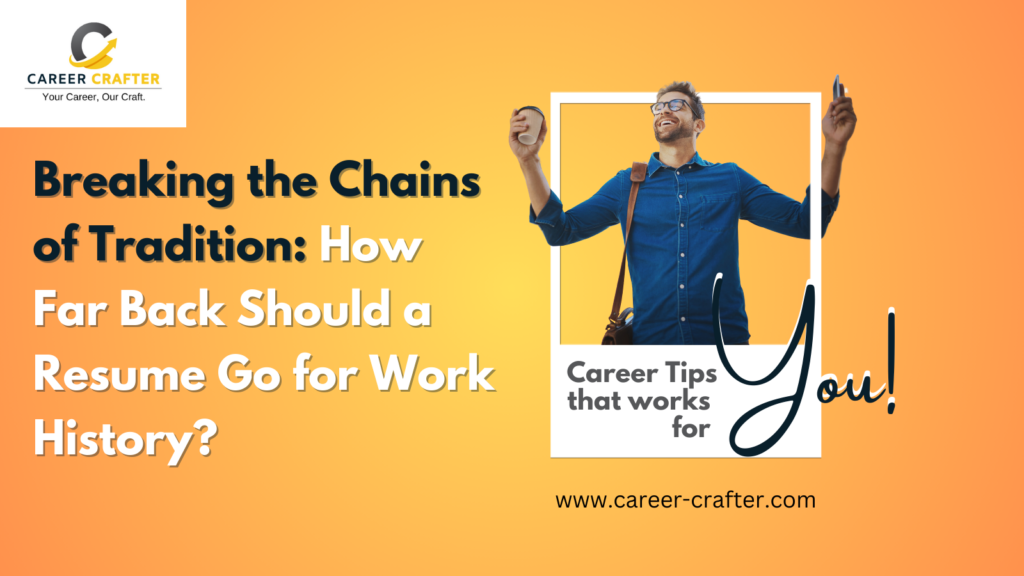Welcome, mid to senior level managers! Are you feeling overwhelmed by the age-old question of how far back your resume should go when it comes to work history? Fear not, for we are here to liberate you from the confines of outdated norms and provide you with a modern perspective. In this comprehensive blog, we will delve deep into the challenges faced by job seekers in the recruitment industry and address the specific problem of determining the ideal work history length. Join us as we dive into the solutions and empower you to craft a powerful resume that showcases your skills and experiences effectively.
The Problem:
In the competitive landscape of the job market, crafting a compelling resume is crucial for mid to senior level managers. However, determining how far back your work history should go poses a significant challenge. Let’s explore the key problems faced by professionals like you:
1. Information Overload:
After years of professional experience, condensing your entire work history into a concise document can be overwhelming. You may be unsure of which experiences to highlight and how to strike the right balance between depth and brevity.
2. Ageism and Discrimination:
Unfortunately, ageism can still be prevalent in certain industries. Older professionals may face biases that assume their ability to adapt to new technologies or their relevance in today’s dynamic business landscape. Consequently, job seekers with extensive work histories may feel pressured to downplay or omit earlier experiences to combat potential age-related biases.
3. Irrelevancy of Past Experiences:
Accumulating diverse work experiences over the years is a testament to your professional growth. However, not all past roles and responsibilities may be directly relevant to your current career goals. Including outdated or unrelated work history can clutter your resume and distract recruiters from your most recent accomplishments.
4. Space Constraints:
Resumes are typically expected to be concise, ranging from one to two pages. With limited space, it becomes challenging to include an extensive work history without sacrificing other important sections such as skills, achievements, and education.
5. Evolving Industries:
Rapid advancements in technology and shifting market trends result in industries evolving at a rapid pace. This evolution may render certain past experiences less relevant or outdated. Therefore, deciding which experiences to include becomes critical for presenting yourself as a competitive candidate.
The Solution:
Now that we’ve identified the problems, let’s explore practical solutions to overcome them:
1. Tailor Your Resume to the Job Description:
Rather than adopting a one-size-fits-all approach, analyze each job description carefully. Identify the key skills, qualifications, and experiences sought by the employer. Tailor your resume to emphasize the most relevant aspects of your work history that align with the specific role.
2. Focus on Accomplishments and Impact:
Instead of fixating on specific dates, prioritize showcasing your accomplishments and the impact you made in each role. Highlight the results you achieved, the challenges you overcame, and the value you brought to previous employers. This approach allows recruiters to gauge your abilities and contributions effectively.
3. Summarize Early Career Experiences:
If you have an extensive work history beyond the past 10-15 years, consider creating a condensed section that summarizes key roles and notable achievements from that period. This allows you to acknowledge earlier experiences without sacrificing space or overwhelming the reader with excessive details.
4. Leverage Online Platforms:
In addition to your resume, leverage online platforms such as LinkedIn and personal websites to provide a more comprehensive view of your work history. Include the link to your LinkedIn profile or website on your resume, allowing recruiters to explore your complete professional journey if they desire.
5. Combat Ageism Through Value Demonstration:
Instead of focusing on your age, emphasize your value as a professional. Highlight your ability to adapt, learn and grow in a rapidly changing landscape. Showcase your ongoing professional development, such as recent certifications, courses, or relevant projects, to demonstrate your commitment to staying current and relevant.
6. Network Strategically:
Networking can be a powerful tool in your job search. Cultivate relationships within your industry, attend industry events, and engage with professional communities. By building a strong network, you increase your chances of being referred for job opportunities, bypassing some of the traditional resume scrutiny and gaining direct access to decision-makers.
7. Seek Feedback and Adapt:
As you navigate the job market, don’t hesitate to seek feedback on your resume. Reach out to mentors, career coaches, or trusted colleagues for their input. Use their insights to refine and improve your resume, ensuring that it effectively highlights your most valuable experiences and aligns with current industry expectations.
Conclusion:
Crafting a powerful resume that effectively showcases your skills and experiences is a crucial step in landing your desired job. When determining how far back your resume should go for work history, it’s essential to strike a balance between relevancy and conciseness. Embrace a modern approach by tailoring your resume, focusing on accomplishments, leveraging online platforms, combating ageism through value demonstration, networking strategically, and seeking feedback. By adopting these solutions, you can overcome the challenges posed by extensive work histories and position yourself as a strong candidate in the eyes of recruiters. Remember, your professional worth goes beyond the length of your work history; it lies in the unique combination of skills, experiences, and value you bring to the table. Embrace the opportunities that lie ahead, rewrite the rules, and unleash your career potential.
- You may also like to read:
- Should You Remove Old Work Experience From Your Resume? A Comprehensive Guide for Mid to Senior Level Managers
- Are You Struggling to Get Job Interviews? The Problem Might Be Your Resume
- Maximize Your Job Search Success: Why Investing in a Professional Resume Writing Service Is a Game-Changer

